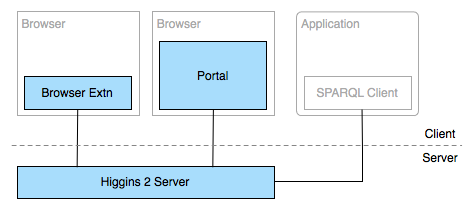Notice: This Wiki is now read only and edits are no longer possible. Please see: https://gitlab.eclipse.org/eclipsefdn/helpdesk/-/wikis/Wiki-shutdown-plan for the plan.
Difference between revisions of "Higgins 2.0"
| Line 7: | Line 7: | ||
*'''Higgins 2 Server:''' This provides an RDF data store of the users' data, organized according to the [[Persona_Data_Model_2.0|Persona Data Model 2.0]]. It exposes this data to the Higgins javascript client via a Comet messaging interface, enabling javascript applications such as the Browser Extension and the Portal, described below. It also exposes the data via a generic SPARQL endpoint for server-to-server integrations. | *'''Higgins 2 Server:''' This provides an RDF data store of the users' data, organized according to the [[Persona_Data_Model_2.0|Persona Data Model 2.0]]. It exposes this data to the Higgins javascript client via a Comet messaging interface, enabling javascript applications such as the Browser Extension and the Portal, described below. It also exposes the data via a generic SPARQL endpoint for server-to-server integrations. | ||
*'''Higgins 2 Portal/Client:''' This is the pure web HTML/JavaScript client UI. It lets the user see and edit attributes. | *'''Higgins 2 Portal/Client:''' This is the pure web HTML/JavaScript client UI. It lets the user see and edit attributes. | ||
| − | *'''Higgins 2 Browser Extension:''' | + | *'''Higgins 2 Browser Extension:''' Loads JavaScript programs from the PDS and runs them within the browser. It also provides an API that allows it to read and write to the PDS. This locally running code could, for example scrape data from a web page and store it in the PDS. |
These conceptual pieces are broken down to a much more granular level and implemented in many components, as described in the [[Personal_Data_Service_Overview#Components|Personal Data Service Overview]]. | These conceptual pieces are broken down to a much more granular level and implemented in many components, as described in the [[Personal_Data_Service_Overview#Components|Personal Data Service Overview]]. | ||
Revision as of 17:27, 23 August 2011
{{#eclipseproject:technology.higgins|eclipse_custom_style.css}}Higgins 2 is the new stuff that we're working on - it is a Personal Data Service. The view from 50,000 feet looks like this:
The current demonstration code contains three major conceptual pieces:- Higgins 2 Server: This provides an RDF data store of the users' data, organized according to the Persona Data Model 2.0. It exposes this data to the Higgins javascript client via a Comet messaging interface, enabling javascript applications such as the Browser Extension and the Portal, described below. It also exposes the data via a generic SPARQL endpoint for server-to-server integrations.
- Higgins 2 Portal/Client: This is the pure web HTML/JavaScript client UI. It lets the user see and edit attributes.
- Higgins 2 Browser Extension: Loads JavaScript programs from the PDS and runs them within the browser. It also provides an API that allows it to read and write to the PDS. This locally running code could, for example scrape data from a web page and store it in the PDS.
These conceptual pieces are broken down to a much more granular level and implemented in many components, as described in the Personal Data Service Overview.
Code
The build instructions and links to the code are on the Developers page.
See Also
The following wiki pages are part of Higgins 2:


